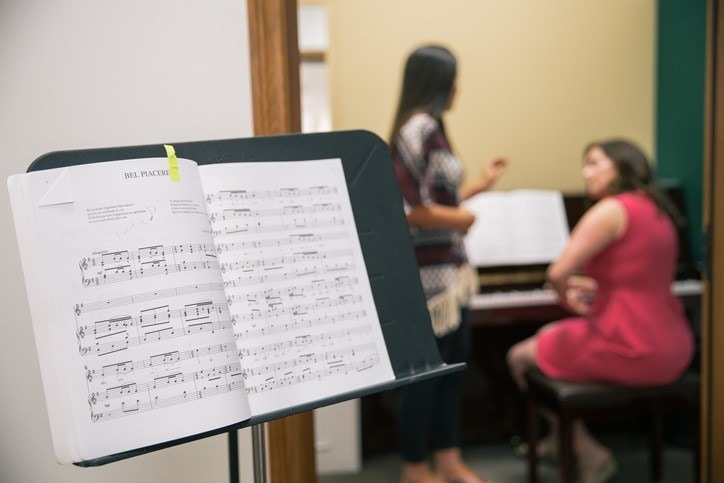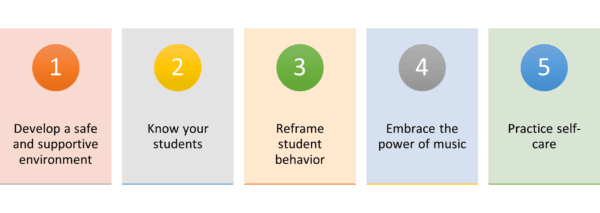/ News Posts / Trauma-Informed Practices in the Music Classroom
Trauma-Informed Practices in the Music Classroom
By NAfME Member Abigail Van Klompenberg
Presenting Supporting Trauma-Informed Practices through Music and the Arts at the “NAfME is ME!” 2022 NAfME National Conference in National Harbor, Maryland. Register now.
The word “trauma” is commonly appearing in conversations around education and students today. Is trauma in schools truly as common as it appears to be? The National Child Traumatic Stress Network (NCTSN, 2022) found that approximately 25% of American children and adolescents will experience one traumatic event by the age of 16. Traumatic experiences can include, but are not limited to, community violence, natural disasters, divorce, death of a loved one, neglect, or abuse. Adverse Childhood Experiences (also known as ACES) have been found to impact people’s health into adulthood, even if the trauma occurred in childhood (Felitti et al., 1998). Trauma, unfortunately, is a part of many students’ lives.
Trauma can affect students’ physical and mental health, social interactions, and ability to learn (NCTSN, 2022). Trauma can cause physical shifts in the body including headaches, stomachaches, or sleep issues. Students who have experienced trauma may struggle with expressing or regulating their emotions. Learning may be more challenging for students with trauma histories, as trauma can lead to memory problems and focus issues.
Knowing the many negative effects of trauma, what can we do to help these students? Through trauma-informed practices, music educators can support students affected by trauma. Below are five trauma-informed practices that can be easily implemented in music classrooms.
Develop a Safe and Supportive Environment
Trauma is rooted in fear and a lack of safety. Creating a space where students feel welcome and safe can help students impacted by trauma. Greet students with a smile and kindness. Speak with your students in a calm, respectful tone. Agendas and schedules can help students feel secure in the predictable routine of a class.
Know Your Students
It is not essential to know the specific details of a students’ trauma history. It is important to know who they are as people, though. Who are the caring adults in their life? What are the students’ hobbies and interests? What are the students’ educational needs outside the music classroom? Knowing these things can help you create a student-centered classroom where students feel heard and seen. Music teachers can use their knowledge of students’ backgrounds to plan lessons and performances that reflect their students. Through awareness of students’ lives outside the school, they can better communicate with the child’s at-home support network and provide more thoughtful support in the classroom.
Reframe Student Behavior
In trauma-informed education, the question of “what is wrong with you?” shifts to “what happened to you?” This reconceptualization of behavior cannot change what happened to the student when they experienced trauma. Rather, it recognizes and validates the potential effects of trauma on the student and their behavior. Trauma-informed practices do not require students to receive a free pass to behave badly. A student who is screaming out in the loud music room may not be doing it to be disruptive. Perhaps the loud environment activated their flight or fight response, and they are acting out because they are overwhelmed. Educators using trauma-informed principles approach discipline compassionately through restorative practices that help students learn and grow.
Embrace the Power of Music
Listening to, creating, and performing music are all emotional experiences. Music can lift a room with joy or express deep sorrow. Social-emotional learning and music curriculum can assist students in their emotional development (Edgar, 2017). Within your repertoire and curriculum, allow a space for emotion. Even if the music you are including brings up difficult emotions in your students, validate those emotions. Give the students a space to let the music and emotion exist. Music can also bring us together. Create a safe classroom where your students feel the joy of music as a unified community.
Practice Self-Care
Working with and caring for students with trauma histories can affect a teacher’s mental health and well-being. Music teachers are not social workers or mental health counselors and should not attempt to take on the role of those professionals. Regardless, the awareness of our students’ trauma can impact an educators’ mental health and well-being. Instituting self-care can help you stay healthy and happy when encountering trauma in your classroom. Take care of your physical health through healthy eating, proper exercise, and getting adequate sleep. Prioritize time with people who bring joy in your life, whether it be family, friends, or colleagues. If you feel like you are struggling with mental health, seek guidance from a certified mental health professional. It is always OK to ask for help, no matter how strong we as teachers may be.
Our students’ trauma does not have to define or limit them. Music students are so much more than what has happened to them. Music teachers work with students to enrich their lives and learning through music. Through trauma-informed practices we can help students even more, providing a safe and healing environment where students will thrive.
References
Felitti, V. J., Anda, R. F., Nordenberg, D., Williamson, D. F., Spitz, A. M., Edwards, V., Koss, M. P., & Marks, J. S. (1998). Relationship of childhood abuse and household dysfunction to many of the leading causes of death in adults. American Journal of Preventive Medicine, 14(4), 245–258.
National Child Traumatic Stress Network (NCTSN). (2022). Resources for school personnel.
About the author:
 NAfME member Abigail Van Klompenberg is a PhD candidate in music education at the University of Kentucky. She is a National Board Certified Teacher in early middle childhood vocal music. Abigail taught general music and choir over the course of 12 years in Arizona, South Carolina, and Texas. She has completed AOSA Teacher Education Levels I-III. Her research interests include innovative music practices, teacher mental health, and trauma-informed education. Learn more at her website. And follow her on Twitter: @VKMusicEd.
NAfME member Abigail Van Klompenberg is a PhD candidate in music education at the University of Kentucky. She is a National Board Certified Teacher in early middle childhood vocal music. Abigail taught general music and choir over the course of 12 years in Arizona, South Carolina, and Texas. She has completed AOSA Teacher Education Levels I-III. Her research interests include innovative music practices, teacher mental health, and trauma-informed education. Learn more at her website. And follow her on Twitter: @VKMusicEd.
Did this blog spur new ideas for your music program? Share them on Amplify! Interested in reprinting this article? Please review the reprint guidelines.
The National Association for Music Education (NAfME) provides a number of forums for the sharing of information and opinion, including blogs and postings on our website, articles and columns in our magazines and journals, and postings to our Amplify member portal. Unless specifically noted, the views expressed in these media do not necessarily represent the policy or views of the Association, its officers, or its employees.
October 28, 2022. © National Association for Music Education (NAfME.org)
Published Date
October 28, 2022
Category
- Culturally Relevant Teaching
- Social Emotional Learning
Copyright
October 28, 2022. © National Association for Music Education (NAfME.org)







